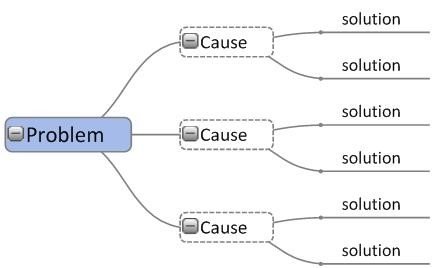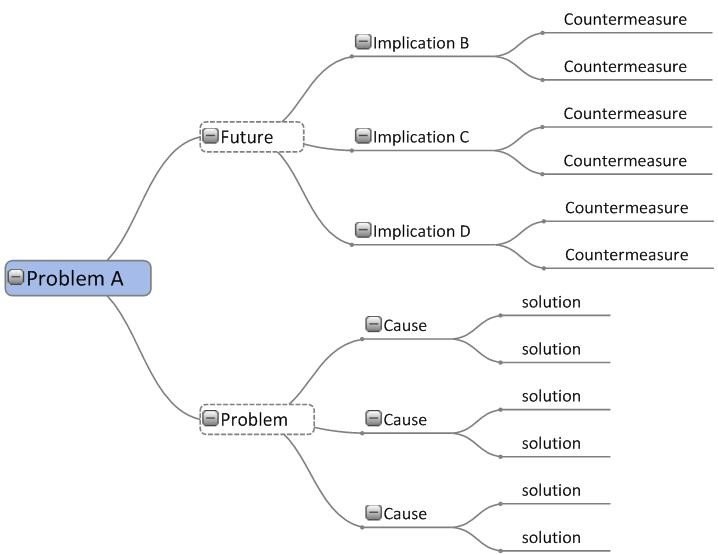Management Training: Problem Solving Skills
If you are a manager, then you need to be a problem solver. The life of a manager is full of problems to solve. Your task, as a manager, is to solve problems quicker than they crop up. If you have this process the wrong way round, if problems crop up at a rate that is faster than you can solve them, then your problems pile up and your progress stops. Therefore problem solving is one of the master skills of management.
Three categories of problem solving
There are three fundamental aspects to problems solving:
- Problem prevention: this means pre-empting the problem and stopping it before it even has time to happen. Prevention is the best form of problem solving.
- Problem, cause, solution: this means analysing the causes of problems and interrupting or eliminating the causes that are feeding and maintaining the problem state. If the causes of the problem are identified and removed, the problem state should cease to exist.
- Problem, implication, countermeasure: This means analysing the implications of an existing problem and taking countermeasures to reduce the negative effects of the existing problem. Note that problem implication countermeasure also contains within it, elements of problem prevention; meaning that if you have problem A already, then the existence of problem A may have potential to create a second problem B that could be worse than problem
For example, if you had a broken leg in plaster, then we could call that "problem A".
Then, if you were to get on an aeroplane for a long haul flight to Australia, with a leg in plaster, that combination could lead to a deep vein thrombosis (D.V.T.) which could be your next, VERY serious "problem B".
1. Problem prevention. Scanning the situation
So your brain should be scanning the situation and asking:
What are the likely problems that could occur?
Without being negative or depressed, you must expect things to go wrong. Putting it the other way, don't expect all your plans to work out as planned.
Why do your plans not work out the way you visualised them?
Answer: because your plans were built by human beings who don't have access to all the knowledge and even if you did have all the knowledge of the current situation, the situation is in a state of flux, and will be different tomorrow.
So expect unexpected things to happen.You need not be surprised when you get stuck behind a slow moving tractor, which delays you for your meeting by 20 minutes. Don't blame your lateness on the tractor. Blame your lateness on the fact that you failed to take account of the unpredictable predictable problem.
On one level the tractor was unpredictable. But on another more general level you can be pretty certain that something will go wrong during the day. Your job is to build into your plan, a certain level of expectation of problems. And if you can use your imagination and intelligence you may even be able to predict the "unpredictable-event" and take evasive action before the problem manifests itself.
2. Problem, cause, solution
Whenever you have a problem you need to draw the problem cause solution mind map and fill it in.

Name the problem, name three major causes of the problem and name the 6 possible best solutions for the three major causes. Enact the best three solutions and the problem should be solved.
3. Problem implication and countermeasure
If you really want to go-to-town on problem solving then get accustomed to thinking in terms of the following mental image. Whenever problems arise, which is every day, then either draw this shape out for others to see, or think of this shape in your mind's eye, and begin to fill in the details.
Name the problem A.
Find the main causes of A.
Write down the 6 solutions to A.
Then think of the possible problematic implications of A, which would be possible problems in their own right.
Write down the 6 countermeasures that would need to be set in place to forestall the implied problems B,C and D.

If you did what we are suggesting here, and even better, if you got your whole team together and did the analysis together according to the above diagram, can you imagine how interesting and beneficial that could be?
Go for it!
Blogs by Email
Do you want to receive an email whenever we post a new blog? The blogs contain article 5-10 minutes long - ideal for reading during your coffee break!
Further Reading in Leadership and Management
-
Leadership Skills: Keep Calm and Carry On
Irrespective of your thoughts on whether or not Brexit is good or bad, the fact is that the UK will soon be making its negotiations to leave the EU and we need to succeed.
Read Article > -
What skills do you need to be a leader?
Leaders have a set of skills and abilities which enables them to see a better future and work towards it. They are willing to adapt and change their plans and inspire others. How many of these ten leadership abilities do you have?
Read Article > -
Management Training
Every manager is unique, but the role of all managers is specific. Managers organise the daily workings of the team. Bad managers can negatively affect the team, therefore it is vital that all managers have training in good management practices.
Read Article > -
What is the RACI Matrix?
Learn more about the RACI Matrix, a model for clarifying responsibilities in a project, in this article from expert management trainer Chris Farmer.
Read Article > -
Why "Free Online Management Courses" Might Not Be the Best Choice for You
Discover why free online management courses might not provide the depth or support needed to advance your career. Explore the value of professional training, including expert-led courses like our two-day Leadership and Management Training.
Read Article >
Looking for Leadership and Management Training?
If you're looking to develop your Leadership and Management Skills, you may find this Leadership and Management Training Course beneficial:
Open Training Course Pricing and Availability
Next Open Course Starts in 9 days, London - Central, places available







